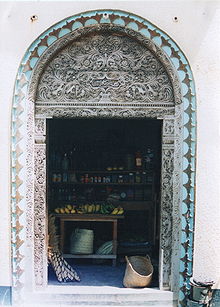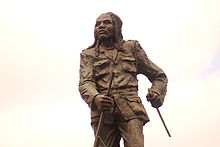
Kenya (/ˈkɛnjə/; locally [ˈkɛɲa] ( listen)), officially the Republic of Kenya, is a country in Africa and a founding member of the East African Community (EAC). Its capital and largest city is Nairobi. Kenya's territory lies on the equator and overlies the East African Rift covering a diverse and expansive terrain that extends roughly from Lake Victoria to Lake Turkana (formerly called Lake Rudolf) and further south-east to the Indian Ocean. It is bordered by Tanzania to the south, Uganda to the west, South Sudan to the north-west, Ethiopia to the north and Somalia to the north-east. Kenya covers 581,309 km2 (224,445 sq mi), and had a population of approximately 45 million people in July 2014.
Kenya has a warm and humid tropical climate on its Indian Ocean coastline. The climate is cooler in the savannah grasslands around the capital city, Nairobi, and especially closer to Mount Kenya, which has snow permanently on its peaks. Further inland, in the Nyanza region, there is a hot and dry climate which becomes humid around Lake Victoria, the largest tropical fresh-water lake in the world. This gives way to temperate and forested hilly areas in the neighbouring western region. The north-eastern regions along the border with Somalia and Ethiopia are arid and semi-arid areas with near-desert landscapes. Kenya is known for its safaris, diverse climate and geography, and expansive wildlife reserves and national parks such as the East and West Tsavo National Park, the Maasai Mara, Lake Nakuru National Park, and Aberdares National Park. Kenya has several world heritage sites such as Lamu and numerous beaches, including in Diani, Bamburi and Kilifi, where international yachting competitions are held every year.

The African Great Lakes region, which Kenya is a part of, has been inhabited by humans since the Lower Paleolithic period. By the first millennium AD, the Bantu expansion had reached the area from West-Central Africa. The borders of the modern state consequently comprise the crossroads of the Niger-Congo, Nilo-Saharan and Afroasiatic areas of the continent, representing most major ethnolinguistic groups found in Africa. Bantu and Nilotic populations together constitute around 97% of the nation's residents. European and Arab presence in coastal Mombasa dates to the Early Modern period; European exploration of the interior began in the 19th century. The British Empire established the East Africa Protectorate in 1895, which starting in 1920 gave way to the Kenya Colony. Kenya obtained independence in December 1963. Following a referendum in August 2010 and adoption of a new constitution, Kenya is now divided into 47 semi-autonomous counties, governed by elected governors.
The capital, Nairobi, is a regional commercial hub. The economy of Kenya is the largest by GDP in East and Central Africa. Agriculture is a major employer; the country traditionally exports tea and coffee and has more recently begun to export fresh flowers to Europe. The service industry is also a major economic driver. Additionally, Kenya is a member of the East African Community trading bloc.
Etymology

The Republic of Kenya is named after Mount Kenya. The origin of the name Kenya is not clear, but perhaps linked to the Kikuyu, Embu and Kamba words Kirinyaga, Kirenyaa, and Kiinyaa which mean "God's resting place" in all three languages.[10] If so, then the British may not so much have mispronounced it ('Keenya'), as misspelled it. Prehistoric volcanic eruptions of Mount Kenya (now extinct) may have resulted in its association with divinity and creation among the indigenous Bantu ethnic groups, who are the native inhabitants of the agricultural land surrounding Mount Kenya.
History
Main article: History of Kenya
Prehistory
The Turkana boy, a 1.6-million-year-old hominid fossil belonging to Homo erectus.

Fossils found in Kenya suggest that primates roamed the area more than 20 million years ago. Recent findings near Lake Turkana indicate that hominids such as Homo habilis (1.8 and 2.5 million years ago) and Homo erectus (1.8 million to 350,000 years ago) are possible direct ancestors of modern Homo sapiens, and lived in Kenya in the Pleistocene epoch.
During excavations at Lake Turkana in 1984, paleoanthropologist Richard Leakey assisted by Kamoya Kimeu discovered the Turkana Boy, a 1.6-million-year-old fossil belonging to Homo erectus. Previous research on early hominids is particularly identified with Mary Leakey and Louis Leakey, who were responsible for the preliminary archaeological research at Olorgesailie and Hyrax Hill. Later work at the former site was undertaken by Glynn Isaac.
Geography and climate
Main article: Geography of Kenya
A map of Kenya.
A Köppen climate classification map of Kenya.
At 580,367 km2 (224,081 sq mi),[2] Kenya is the world's forty-seventh largest country (after Madagascar). It lies between latitudes 5°N and 5°S, and longitudes 34° and 42°E. From the coast on the Indian Ocean, the low plains rise to central highlands. The highlands are bisected by the Great Rift Valley, with a fertile plateau lying to the east.
The Kenyan Highlands comprise one of the most successful agricultural production regions in Africa.[61] The highlands are the site of the highest point in Kenya and the second highest peak on the continent: Mount Kenya, which reaches 5,199 m (17,057 ft) and is the site of glaciers. Mount Kilimanjaro (5,895 m or 19,341 ft) can be seen from Kenya to the south of the Tanzanian border.
Read More
 Kenya (/ˈkɛnjə/; locally [ˈkɛɲa] ( listen)), officially the Republic of Kenya, is a country in Africa and a founding member of the East African Community (EAC). Its capital and largest city is Nairobi. Kenya's territory lies on the equator and overlies the East African Rift covering a diverse and expansive terrain that extends roughly from Lake Victoria to Lake Turkana (formerly called Lake Rudolf) and further south-east to the Indian Ocean. It is bordered by Tanzania to the south, Uganda to the west, South Sudan to the north-west, Ethiopia to the north and Somalia to the north-east. Kenya covers 581,309 km2 (224,445 sq mi), and had a population of approximately 45 million people in July 2014.
Kenya (/ˈkɛnjə/; locally [ˈkɛɲa] ( listen)), officially the Republic of Kenya, is a country in Africa and a founding member of the East African Community (EAC). Its capital and largest city is Nairobi. Kenya's territory lies on the equator and overlies the East African Rift covering a diverse and expansive terrain that extends roughly from Lake Victoria to Lake Turkana (formerly called Lake Rudolf) and further south-east to the Indian Ocean. It is bordered by Tanzania to the south, Uganda to the west, South Sudan to the north-west, Ethiopia to the north and Somalia to the north-east. Kenya covers 581,309 km2 (224,445 sq mi), and had a population of approximately 45 million people in July 2014.
 The African Great Lakes region, which Kenya is a part of, has been inhabited by humans since the Lower Paleolithic period. By the first millennium AD, the Bantu expansion had reached the area from West-Central Africa. The borders of the modern state consequently comprise the crossroads of the Niger-Congo, Nilo-Saharan and Afroasiatic areas of the continent, representing most major ethnolinguistic groups found in Africa. Bantu and Nilotic populations together constitute around 97% of the nation's residents. European and Arab presence in coastal Mombasa dates to the Early Modern period; European exploration of the interior began in the 19th century. The British Empire established the East Africa Protectorate in 1895, which starting in 1920 gave way to the Kenya Colony. Kenya obtained independence in December 1963. Following a referendum in August 2010 and adoption of a new constitution, Kenya is now divided into 47 semi-autonomous counties, governed by elected governors.
The African Great Lakes region, which Kenya is a part of, has been inhabited by humans since the Lower Paleolithic period. By the first millennium AD, the Bantu expansion had reached the area from West-Central Africa. The borders of the modern state consequently comprise the crossroads of the Niger-Congo, Nilo-Saharan and Afroasiatic areas of the continent, representing most major ethnolinguistic groups found in Africa. Bantu and Nilotic populations together constitute around 97% of the nation's residents. European and Arab presence in coastal Mombasa dates to the Early Modern period; European exploration of the interior began in the 19th century. The British Empire established the East Africa Protectorate in 1895, which starting in 1920 gave way to the Kenya Colony. Kenya obtained independence in December 1963. Following a referendum in August 2010 and adoption of a new constitution, Kenya is now divided into 47 semi-autonomous counties, governed by elected governors.
 The Republic of Kenya is named after Mount Kenya. The origin of the name Kenya is not clear, but perhaps linked to the Kikuyu, Embu and Kamba words Kirinyaga, Kirenyaa, and Kiinyaa which mean "God's resting place" in all three languages.[10] If so, then the British may not so much have mispronounced it ('Keenya'), as misspelled it. Prehistoric volcanic eruptions of Mount Kenya (now extinct) may have resulted in its association with divinity and creation among the indigenous Bantu ethnic groups, who are the native inhabitants of the agricultural land surrounding Mount Kenya.
The Republic of Kenya is named after Mount Kenya. The origin of the name Kenya is not clear, but perhaps linked to the Kikuyu, Embu and Kamba words Kirinyaga, Kirenyaa, and Kiinyaa which mean "God's resting place" in all three languages.[10] If so, then the British may not so much have mispronounced it ('Keenya'), as misspelled it. Prehistoric volcanic eruptions of Mount Kenya (now extinct) may have resulted in its association with divinity and creation among the indigenous Bantu ethnic groups, who are the native inhabitants of the agricultural land surrounding Mount Kenya. Fossils found in Kenya suggest that primates roamed the area more than 20 million years ago. Recent findings near Lake Turkana indicate that hominids such as Homo habilis (1.8 and 2.5 million years ago) and Homo erectus (1.8 million to 350,000 years ago) are possible direct ancestors of modern Homo sapiens, and lived in Kenya in the Pleistocene epoch.
Fossils found in Kenya suggest that primates roamed the area more than 20 million years ago. Recent findings near Lake Turkana indicate that hominids such as Homo habilis (1.8 and 2.5 million years ago) and Homo erectus (1.8 million to 350,000 years ago) are possible direct ancestors of modern Homo sapiens, and lived in Kenya in the Pleistocene epoch.
